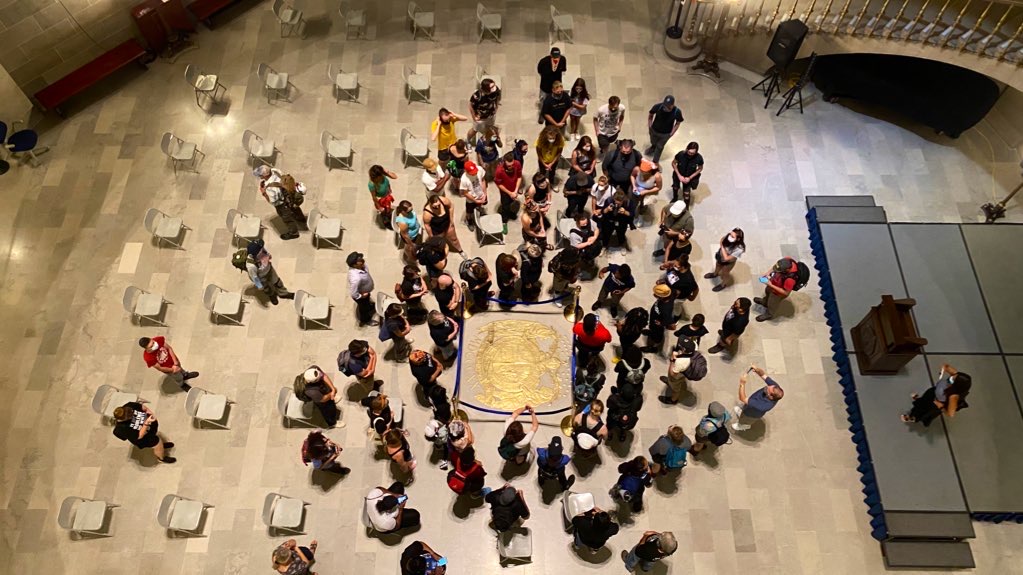JEFFERSON CITY, Mo. — After hitting a roadblock right out of the gate, legislation meant to address violent crime in Missouri eventually cleared a Senate hurdle after a 12-hour debate Thursday.
It was a contentious topic even before lawmakers convened in Jefferson City for the special session — especially with nationwide protests against racism and police brutality in the backdrop — but two provisions, in particular, seemed to be at the heart of Thursday’s dispute. On the surface: residency requirements for St. Louis police officers; more behind the scenes: juvenile certification.
SB 1, championed by outgoing Sen. Doug Libla, includes an end to residency requirements for St. Louis police officers and other public safety personnel, certification to try certain juveniles as adults, witness statement admissibility, creation of a pre-trial witness protection fund, modification of the offense of endangering a child, and an increased penalty for illegally transferring a firearm to a minor.
Debate over the bill began shortly before 10:30 a.m. as it was brought up for perfection. Sens. Jamilah Nasheed and Karla May, both from the St. Louis area, held court for much of the day, decrying the idea that lawmakers outside of their city could dictate what goes on within it. Both also noted residency requirements for city workers is already on the November ballot.
“I feel offended that you’d be as disrespectful as this and not allow the senators who represent the area to decide what’s best for the area,” May said early on in the day.
But after more than 12 hours, a compromise was reached. The juvenile certification age for crimes considered a felony for adults was raised from 12 to 14 years old. However, for certain felony offenses, such as unlawful use of a weapon or armed criminal action, a court could certify younger minors.
In addition, the Senate added a data collection provision to the bill related to the juvenile certification portion. The collection will include things such as age, race, type of conviction, and if a minor waived the right to counsel. That information will be shared annually with the General Assembly, juvenile officers, and juvenile court commissioners and judges.
While the residency requirements were in jeopardy earlier in the day, St. Louis City’s lobbying corps kept the negotiations alive and ultimately played a key role in finalizing a deal on the legislative language.
Under the current format, residency requirements for St. Louis police officers are removed — albeit, officers must live within a one-hour response time. Lawmakers agreed to a three-year sunset on the provision Thursday.
‘Criminal justice reform, not rhetoric’

While the kerfuffle on the Senate floor continued, a few dozen people — along with some lawmakers — gathered in front of the Capitol in protest of the legislation. Organized by the group Expect Us, demonstrators said they wanted legislators to address the “root cause” of violence, such as better educational and employment opportunities. They also protested against the bill’s provision that would allow children to be tried as adults for certain crimes.
After gathering on the lawn, the group, led by state Rep. Rasheen Aldridge, made its way inside the Capitol and settled in the upper chamber of the Senate as the debate continued. Nasheed recognized those in the gallery, saying they were participating in “necessary trouble and good trouble,” an homage to the late U.S. Congressman John Lewis.
After sitting quietly in the gallery for a bit, protestors eventually began to chant, “Criminal justice reform, not rhetoric,” shutting down the Senate proceedings as they left. They then convened in the rotunda where Aldridge and Nasheed spoke.
Senate gallery cleared as protestors began chanting “criminal justice reform not rhetoric.” #moleg pic.twitter.com/IrTIcKf6cs
— Kaitlyn Schallhorn (@K_Schallhorn) August 6, 2020
The Senate perfected the bill at 10:30 p.m. and will convene Friday for another vote. But the bill’s next hurdle will be in the lower chamber which is expected to take it up in the middle of next week.
Kaitlyn Schallhorn is the editor of The Missouri Times. She joined the newspaper in early 2019 after working as a reporter for Fox News in New York City.
Throughout her career, Kaitlyn has covered political campaigns across the U.S., including the 2016 presidential election, and humanitarian aid efforts in Africa and the Middle East.
She is a native of Missouri who studied journalism at Winthrop University in South Carolina. She is also an alumna of the National Journalism Center in Washington, D.C.
Contact Kaitlyn at kaitlyn@themissouritimes.com.
"Hour" - Google News
August 07, 2020 at 01:09PM
https://ift.tt/31qMjzX
Violent crime bill advances in Senate after heated 12-hour day - The Missouri Times
"Hour" - Google News
https://ift.tt/2WcHWWo
https://ift.tt/2Stbv5k
Bagikan Berita Ini
















0 Response to "Violent crime bill advances in Senate after heated 12-hour day - The Missouri Times"
Post a Comment